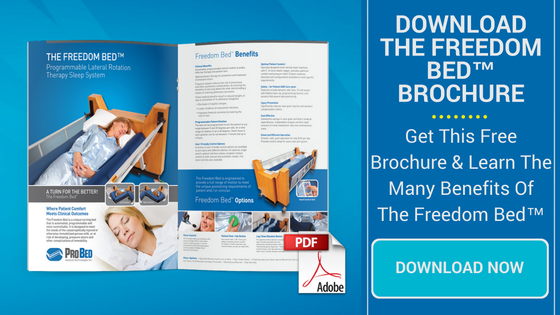Applicable Medical Conditions
The clinically proven Freedom BedTM is recommended for persons suffering from temporary or permanent immobility. This could include:
- Spinal Cord Injuries causing paraplegia and quadriplegia (with or without ventilator)
- Muscular Dystrophy
- Multiple Sclerosis
- ALS
- Cerebral Palsy
- Guillain Barre Syndrome
- Osteomyelitis
- Traumatic Brain Injuries (TBI)
- Stroke
- Cancer
- AIDS
- Coma
- Amputations
- Severe respiratory ailments such as chronic obstructive pulmonary disease and Pneumonia
- Degenerative disk disease, post-spinal fusion and laminectomy
- Pressure Injuries & Bedsores
- Rheumatoid Arthritis
- Immobility due to aging
- Any other condition where the person is bed bound and turning assistance is required
Tube Fed Patients
The torso raising position is also beneficial for tube fed bed users since the bed user can still be rotated with the torso raised up to 30°.
A higher elevation angle can be achieved by combining head elevation with Reverse Trendelenburg.
Complications of Immobility
Bed Turning, Pressure/Decubitus Ulcers and More
A mobile person generally turns approximately once every 10-12 minutes while sleeping. This action provides for healthy blood circulation, stimulation of body organs and movement of body fluids. When a person becomes temporarily or permanently immobilized however, the blood supply to that part of the body that is under pressure is restricted. If that pressure is not regularly relieved, and the blood supply restored, the affected tissue dies and sloughs off resulting in the formation of a bed sore/decubitus ulcer. These occur most commonly on the buttocks, sacrum, hips and heels and can be life-threatening if they become infected. This is commonly referred to as a Pressure Injury.
If that isn’t bad enough there are many other medical complications associated with immobility. These include (but are not limited to):
- Pneumonia
- Venous stasis
- Thrombosis
- Embolism
- Stone formation
- Urinary tract infection (kidney and bladder)
- Muscle wasting
- Bone demineralization
- Atelectasis
Decubitus Ulcers (or Bedsores)
Decubitus ulcers are of major concern to the sufferers, their caregivers, and the medical community. The scale of the problem is immense. It is estimated that approximately 1.2 million people are suffering from bedsores at any one time in the United States alone and almost 70% of sufferers are over 65. It is reported that there are 60,000 deaths annually from complications arising from bedsores and the current cost to the US Health Care System to treat these and other associated conditions is estimated at anywhere from US$15 - $40 billion annually.
Traditional Methods of Prevention
The traditional way to avoid the formation of bedsores is for a family member, caregiver or institutional employee to regularly turn (reposition) and stabilize the patient in a new position to relieve tissue compression and re-establish blood flow. (It is recommended that this be done at a minimum of every two hours). This has to be done around the clock and unfortunately this manual process has a considerable number of drawbacks that include:
- The immobilized patient is woken up during the night by the turning process
- Caregivers, family members or institutional staff can suffer severe back damage from the effort of lifting
- Family members need to be in attendance 24 hours per day and this can lead to severe sleep deprivation and severe emotional stress
- In institutional settings the need to frequently turn immobilized patients is costly both financially and in terms of employee time
- The patient may be in a home environment where the family members are unable to physically provide the necessary regular turning
- If support is not available at home then patients may have to be relocated to a facility leading to a loss of privacy, dignity and the inability to create a life apart from institutional living

